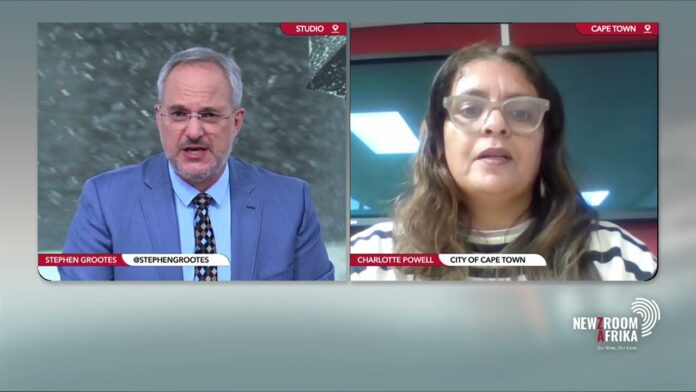Heavy rains and strong winds devastate communities, prompting school closures and emergency responses
The Western Cape is currently grappling with extreme weather conditions, as relentless cold fronts wreak havoc across the region. Schools in the Overberg and Cape Winelands are closed due to the ongoing storms, which have brought severe flooding and damage to numerous communities.
Yonela Dolophini, a resident of the Nkandla informal settlement in Khayelitsha, recounted her family’s narrow escape from disaster. “We escaped from the back as the house got destroyed by the wind,” she said, highlighting the chaos that unfolded when fierce winds and torrential rain struck. Her family lost their home and all their groceries, highlighting the dire situation faced by many in the area.
The storms have been relentless, causing significant flooding and widespread destruction in various neighbourhoods, including Khayelitsha, Lwandle, and Gugulethu. A Level 8 weather warning was issued for Cape Town, Drakenstein, and Stellenbosch, with reports indicating that over 1,000 structures were affected. Ward councillor Lonwabo Mqina described the scene as devastating, with many residents now sleeping outdoors due to damage to their homes.
While rumours of a tornado in Wynberg circulated, the South African Weather Service clarified that the damage was likely caused by strong straight-line winds rather than a tornado. Kate Turner from the Cape Town Weather Office noted the absence of convective development, attributing the severe weather to unusual wind patterns.
In response to the crisis, the human settlements ministry is coordinating efforts to relocate affected residents to temporary accommodations, including hotels and BnBs. Minister Mmamoloko Kubayi emphasized the urgency of these measures, expressing concern about the ongoing Level 8 warning and the potential for further flooding.
As the situation worsens, organizations like Gift of the Givers are stepping in to provide assistance. Project manager Ali Sablay reported that their teams are delivering thousands of meals and blankets to those in need. “Our operations will continue until Sunday,” he stated, demonstrating the community’s resilience in the face of adversity.
The Western Cape Education Department announced the closure of schools for a second consecutive day, prioritizing the safety of students and teachers. David Maynier, MEC for Education, explained that extensive damage to roads and school facilities necessitated this decision. With 217 schools reporting damage, many will require urgent repairs before reopening.
As the weather forecast indicates continued rain and damaging winds, Premier Alan Winde urged residents to prioritize safety and avoid unnecessary risks. Daily Joint Operations Centre meetings are planned to coordinate ongoing relief efforts and monitor the situation.
Analysis
Political Perspective
The current weather crisis in the Western Cape underscores the need for proactive disaster management policies. The frequent occurrence of severe weather events raises questions about infrastructure resilience and urban planning in vulnerable communities. The government’s response, particularly the deployment of temporary housing for displaced residents, highlights the urgency of addressing immediate needs. However, calls for a shift from reactive to proactive measures indicate a growing recognition among officials, including Minister Kubayi, of the importance of long-term planning and investment in disaster preparedness.
Social Perspective
This crisis reflects broader societal issues, particularly regarding inequality in urban areas. Informal settlements like Khayelitsha are disproportionately affected by severe weather due to inadequate infrastructure and resources. The stories of families like Yonela Dolophini’s reveal the harsh realities faced by many South Africans living in precarious conditions. Community support initiatives, such as those led by Gift of the Givers, demonstrate the strength of local networks during crises, yet they also highlight the ongoing struggles faced by marginalized groups.
Racial Perspective
The impact of the storms has predominantly affected communities of color, particularly in informal settlements. This situation illuminates existing racial disparities in South Africa, where historical injustices continue to shape access to resources and infrastructure. The government’s response must consider these inequities to ensure that relief efforts are equitable and reach the most affected populations.
Gender Perspective
Women and children are often the most vulnerable during natural disasters. The challenges faced by families like Dolophini’s illustrate how gender roles can exacerbate the impact of crises. Women frequently bear the burden of caregiving and household responsibilities, making their experiences during such emergencies particularly challenging. Relief efforts must be sensitive to the unique needs of women and children to effectively support their recovery.
Economic Perspective
The economic ramifications of the storms are already being felt, with damages to homes, schools, and infrastructure likely to burden the local economy for years to come. Many families have lost their livelihoods due to property damage, and the costs of rebuilding will place additional strain on an already struggling economy. The need for targeted financial support and investment in resilient infrastructure is clear, as the region must prepare for future weather-related challenges.
